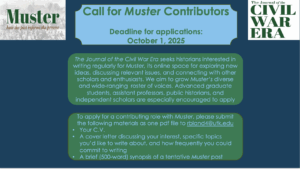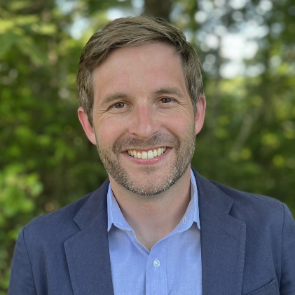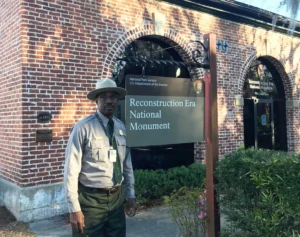
Announcing the 2025 Anthony E. Kaye Memorial Essay Award
The Journal of the Civil War Era is pleased to announce that Dr. J. Jacob Calhoun has been selected as the recipient of the Anthony E. Kaye Memorial Essay Award for 2025. His winning essay is titled, “‘Nothing was known of the dead’: Coroners and the Massacres of 1866.” The prize committee, ...
Read More
Read More

Conversation with Caleb Gayle
In today's Muster, JCWE Associate Editor Robert Bland has a conversation with Caleb Gayle, Associate Professor of Journalism and Africana Studies at Northeastern University. Gayle is the author of Black Moses: A Sage of Ambition and the Fight for a Black State (Penguin, 2025). Gayle is an award-winning journalist whose ...
Read More
Read More

Announcing the Winner of the 2024 George and Ann Richards Prize
Guy Emerson Mount has won the $1,000 George and Ann Richards Prize for the best article published in The Journal of the Civil War Era in 2024. The article, “Shall I Go? Black Colonization in the Pacific, 1840-1914” appeared in the December 2024 special issue, Black Internationalism in the Era of Emancipation, guest edited by ...
Read More
Read More

Previewing the September 2025 JCWE
This issue exemplifies the wide sweep of the Civil War Era as scholars understand it, and the success of the journal’s now fifteen-year-long effort to promote broadminded interrogation of the many forces that shaped the middle of the nineteenth century and reveal their impacts. The issue opens with Yael A ...
Read More
Read More

Call for Muster Contributors
Muster is looking for contributors! We are looking for scholars from a wide range of perspectives to add new voices to our roster. Please read the announcement below and reach out to rbland4@utk.edu if you have any questions. The deadline for applications is October 1, 2025 ...
Read More
Read More
Conversation with Shae Smith Cox
In today's Muster, JCWE Book Review Editor Megan Bever has a conversation with Shae Smith Cox, Assistant Professor at Texas A&M University about her book, The Fabric of Civil War Society: Uniforms, Badges, and Flags, 1859-1939 (LSU Press, 2024) ...
Read More
Read More

Teaching the Civil War: Analyzing the Clinton Massacre Using Authentic Tasks
Today’s Muster continues our series Teaching the Civil War. Each post in the series has examined a different method that college and K-12 teachers have used to make the Civil War era come alive in the classroom. In Todays 's post, University of South Dakota professor Lindsey Peterson explores teaching the history of emancipation ...
Read More
Read More

The Militia Act of 1903 in Historical Context
Recent events have turned public attention to the previously obscure Militia Act of 1903 and the even more obscure historians and political scientists interested in eighteenth- and nineteenth-century insurrection law. President Donald Trump claimed that the measure vests him with the power to federalize members of the California National Guard ...
Read More
Read More

Conversation with June 2025 Special Issue Editors Joan E. Cashin and Alaina E. Roberts
In today’s Muster, Associate Editor Robert Bland discusses the JCWE’s June special issue on material culture with guest editors Joan E. Cashin and Alaina E. Roberts. Dr. Cashin is a professor of history at Ohio State University and author of War Stuff: The Struggle for Human and Environmental Resources in ...
Read More
Read More

Andrew Donnelly, Confederate Sympathies, and the History of Same-Sex Romance during the Civil War Era
In today’s Muster, associate editor Robert Bland is joined by Andrew Donnelly to discuss his new book Confederate Sympathies: Same-Sex Romance, Disunion, and Reunion in the Civil War Era. Professor Donnelly is an assistant professor of English at the University of Memphis. His work has been supported by fellowships from ...
Read More
Read More

Interview with Michael Allen on a Career in Public History
Today's Muster features an interview with Michael Allen, a retired National Park Service official. Over the course of his nearly four decade career, Allen has played a pivotal role in how several Civil War Era sites have reshaped their interpretative vision of the past. More recently, he has played a ...
Read More
Read More

2025 Tom Watson Brown Book Award
The $50,000 Tom Watson Brown Book Award is presented annually by the Watson-Brown Foundation and the Society of Civil War Historians to the author or authors of the best book “on the causes, conduct, and effects, broadly defined, of the Civil War,” published in the preceding year. Each year Tad ...
Read More
Read More

Conversation with Historian and Curator Jill Newmark
In today's Muster, JCWE Book Review Editor Megan Bever is joined by Jill L. Newmark, independent historian and former Curator and Exhibition Specialist at the National Library of Medicine, National Institutes of Health. Newmark is the author of Without Concealment, Without Compromise: The Courageous Lives of Black Civil War Surgeons ...
Read More
Read More

Congratulations to Bianca Dang and Christina C. Davidson
The Latin American Studies Association recently awarded both Bianca Dang and Christina C. Davidson with their 2025 Best Article Prize. Dr. Dang and Dr. Davidson were honored for their respective contributions to the JCWE's 2025 special issue on Black internationalism, which was edited by Brandon R. Byrd. You may read ...
Read More
Read More

Lindsey Peterson Interview on “‘Home Builders’: Free Labor Households and Settler Colonialism in Western Union Civil War Commemorations”
In today’s Muster, associate editor Robert D. Bland speaks with Lindsey R. Peterson about her March 2025 JCWE article “‘Home-Builders': Free Labor Households and Settler Colonialism in Western Union Civil War Commemorations.” This article, which won the 2023 Anthony Kaye Memorial Essay Award, examines the regional effort to connect the legacy of ...
Read More
Read More
